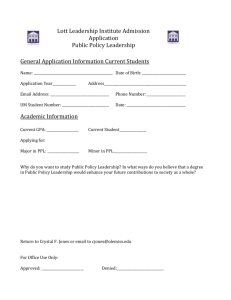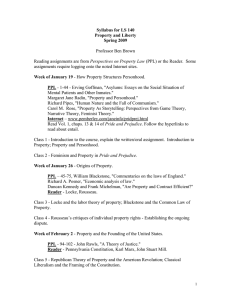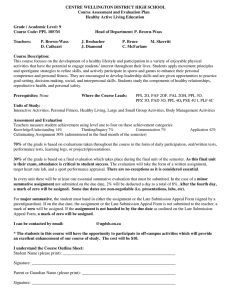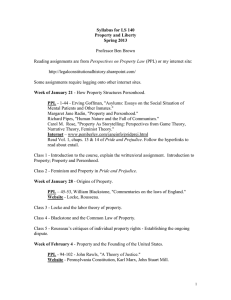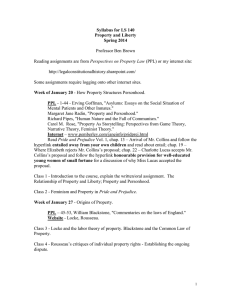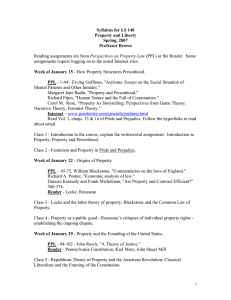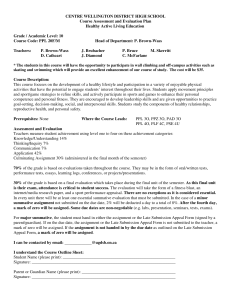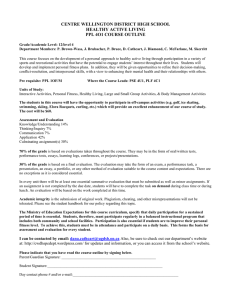Syllabus for LS 140 Property and Liberty Spring 2012
advertisement
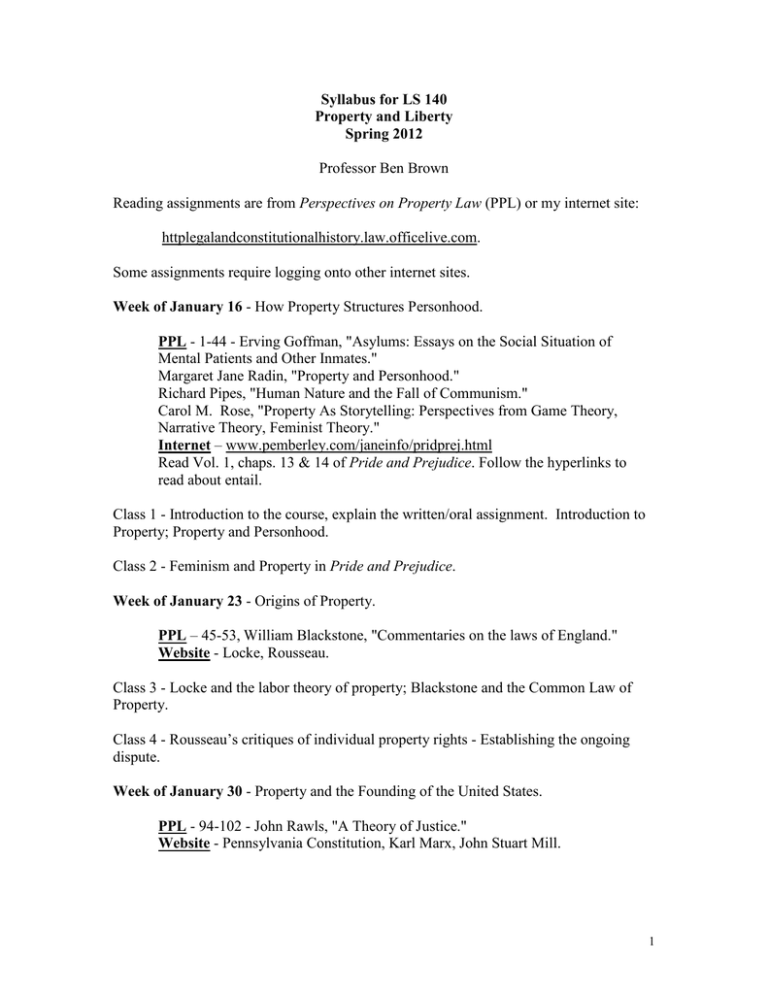
Syllabus for LS 140 Property and Liberty Spring 2012 Professor Ben Brown Reading assignments are from Perspectives on Property Law (PPL) or my internet site: httplegalandconstitutionalhistory.law.officelive.com. Some assignments require logging onto other internet sites. Week of January 16 - How Property Structures Personhood. PPL - 1-44 - Erving Goffman, "Asylums: Essays on the Social Situation of Mental Patients and Other Inmates." Margaret Jane Radin, "Property and Personhood." Richard Pipes, "Human Nature and the Fall of Communism." Carol M. Rose, "Property As Storytelling: Perspectives from Game Theory, Narrative Theory, Feminist Theory." Internet – www.pemberley.com/janeinfo/pridprej.html Read Vol. 1, chaps. 13 & 14 of Pride and Prejudice. Follow the hyperlinks to read about entail. Class 1 - Introduction to the course, explain the written/oral assignment. Introduction to Property; Property and Personhood. Class 2 - Feminism and Property in Pride and Prejudice. Week of January 23 - Origins of Property. PPL – 45-53, William Blackstone, "Commentaries on the laws of England." Website - Locke, Rousseau. Class 3 - Locke and the labor theory of property; Blackstone and the Common Law of Property. Class 4 - Rousseau’s critiques of individual property rights - Establishing the ongoing dispute. Week of January 30 - Property and the Founding of the United States. PPL - 94-102 - John Rawls, "A Theory of Justice." Website - Pennsylvania Constitution, Karl Marx, John Stuart Mill. 1 Class 5 - Republican Theory of Property and the American Revolution; Classical Liberalism and the Framing of the Constitution. Class 6 - Marx and the Critique of Property; Mill and the Critique of Communism. Week of February 6 - Colonialism and Property - How European prejudices about the appropriate use of property rationalized colonialism. PPL - 170-199 - Robert's Sugden "The Economics of Rights, Cooperation and Welfare." Carol M. Rose, "Possession As the Origin of Property." Thomas W. Merrill "Property Rules, Liability Rules, and Adverse Possession." 321-335 - Stuart Banner, "Two Properties, One Land: Law and Space in 19thCentury New Zealand." 135-146 - Harold Demsetz, "Toward a Theory of Property Rights." Website - Paul Finkelman, “Batter Up;” Johnson v. McIntosh; Class 7- Possession as the basis of property; Colonialism in New Zealand. Class 8 - How the Indians lost their land - European versus Native property systems. Week of February 13 - Slavery and Property - What does being owned do to slaves? What does owning people do to owners? PPL - none Website - “Negro Law of South Carolina;” Somerset v. Stewart, Bryan v. Walton, State v. Mann, State v. Boyce, Worley v. State, Dred Scott v. Sanford. . Class 9 - Classical Slavery; Mercantilist and Capitalist Slavery in the United States. Class 10 - Group 1 - Valerie Martin, Property. Week of February 20 - Late 19th and early 20th century Property Theorists and the Critique of Property in the United States. Website - Henry George; Thorstein Veblen. Class 11 - Henry George and the logic of the Single Tax. Class 12 - Thorstein Veblen and the anthropological analysis of property. Week of February 27 - Capitalism and Legal Liberalism in the 20th Century; Common ownership and property - Do communal use systems always lead to inefficiencies? 2 PPL – 75 – 118 Milton Friedman, “Capitalism and Freedom;” John Rawls, “A Theory of Justice;" Mark J. Roe, "Backlash.” 119-135 - Garret Hardin, "The Tragedy of the Commons." James M. Acheson, "The Lobster Gangs of Maine." 146-159 - Robert Ellickson, "Property in Land." 261-272 - Robert Axelrod, "The Evolution of Cooperation." Class 13 – Property and Liberty; Property and Liberalism; Property and Chaos. Class 14 - The tragedy of the commons - The tragedy of the commons critiqued. Week of March 5 – Law and Economics and Property PPL – 200-220 - Ronald H. Coase, "The Problem of Social Cost." Robert C. Ellickson, "Order without Law: How Neighbors Settle Disputes." 54-74 -Richard A. Posner, "Economic Analysis of Law;" Duncan Kennedy & Frank Michelman, “Are Property and Contract Efficient.” 221-232 - Christine Jolls, Cass R. Sunstein & Richard Thaler, "A Behavioral Approach to Law and Economics." Class 15 – Ronald Coase and Efficiency Analysis Class 16 – Critiques of Coase Theorem; Midterm Review. Week of March 12 - Psychology and the Market; Midterm Examination. PPL - 221-232 - Christine Jolls, Cass R. Sunstein & Richard Thaler, "A Behavioral Approach to Law and Economics." Class 17 – Behavioral Psychology and Market v. Social Norms Class 18 - Midterm Exam Week of March 19 – Race and Property in the 20th Century; Property and Poverty PPL - 470-479 - Thomas C. Schelling, "Micro Motives and Macro Behavior." 423-437 - Richard A. Epstein, "Covenants and Constitutions." 374-422 - Richard A. Posner, "Economic Analysis of Law."Douglas W. Allen and Dean Lueck, "The Back 40 on a Handshake: Specific Assets, Reputation, and the Structure of Farmland Contracts." Irving Welfeld, "Poor Tenants, Poor Landlords, Poor Policy." John C. Weicher, "Private Production: Has the Rising Tide Lifted All Boats?" Richard A. Posner, "Economic Analysis of Law" Internet – http://www.sfgate.com/g/special/pages/2003/homeless/ Browse articles in the S.F. Chronicle series on homelessness in the city. 3 Website – Shelley v. Kraemer. Class 19 - “We reserve the right to refuse service!” Civil rights sit-ins and trespass law. Class 20 - Homelessness in San Francisco. Week of March 26 – Have a great spring break!! Week of April 2 – Government Regulation and Property Rights PPL – 480-535 - Frank I. Michelman, "Property, Utility, and Fairness: Comments on the Ethical Foundations of ‘Just Compensation’ Law." William A. Fischel and Perry Shapiro, "Takings, Insurance, and Michelman: Comments on Economic Interpretations of ‘Just Compensation’ Law." Thomas W. Merrill, "Explaining Market Mechanisms." 548-559 - Robert C. Ellickson, Controlling Chronic Misconduct in City Spaces: of Panhandlers, Skid Rows, and Public-Space Zoning." Website - Pennsylvania Coal Co. v. Mahon, Just v. Marinette County. Charles Reich, excerpt from “The New Property;” Goldberg v. Kelly. Class 21 - How severely can the government regulate the use of property before it must pay compensation to the owner? Class 22 - Group 2 - Should Property Rules apply to Government benefits? - Charles Reich, “The New Property.” Week of April 9 - Environmentalism and Eminent Domain Website – Kelo v. New London, Conn. Class 25 - Group 3 - Environmental Conflict - Book - A Good Forest for Dying . Class 26 - Eminent domain and local control of environmental measures. Kelo v. New London, Conn., Oregon Prop 37 and Prop 49, Post-Kelo propositions. Week of April 16 - The Internet and Public Goods - Should the Internet be a commons? PPL – 537-547 - Joseph L. Sax, "The Public Trust Doctrine in Natural Resource Law: Effective Judicial Intervention." 159-169- Michael A. Heller and Rebecca S. Eisenberg, "Can Patents Deter Innovation? The Anticommons in Biomedical Research." 560-572 - Robert P. Merges, "Property Rights Theory and the Commons: the Case of Scientific Research." Internet – http://www.authorama.com/free-culture-1.html Lawrence Lessig, Free Culture, Read chapter 5 on piracy and property 4 Class 27 - An Introduction to Public Goods; The Internet as a commons; Patents, Copyright and Intellectual Property. Class 28 - Group 4 - Lawrence Lessig, Remix: Making Art and Commerce Thrive in the Hybrid Economy Week of April 23 - Organizing the Internet and Internet Piracy. PPL 273-285 - Richard O. Zerbe, Jr. & C. Leigh Anderson, "Culture and Fairness in the Development of Institutions in the California Gold Fields." Class 30 - Organizing the Internet - Cooperation versus Competition. Class 31 - Is Internet Piracy a social good or a social evil? Final - Thursday, May 10 - 8:00 a.m. 5
